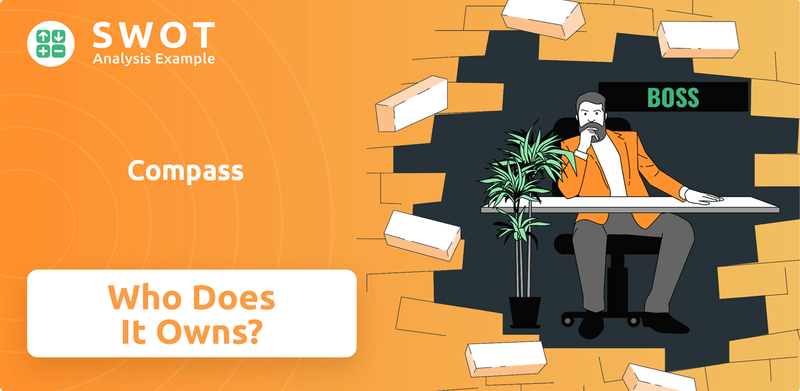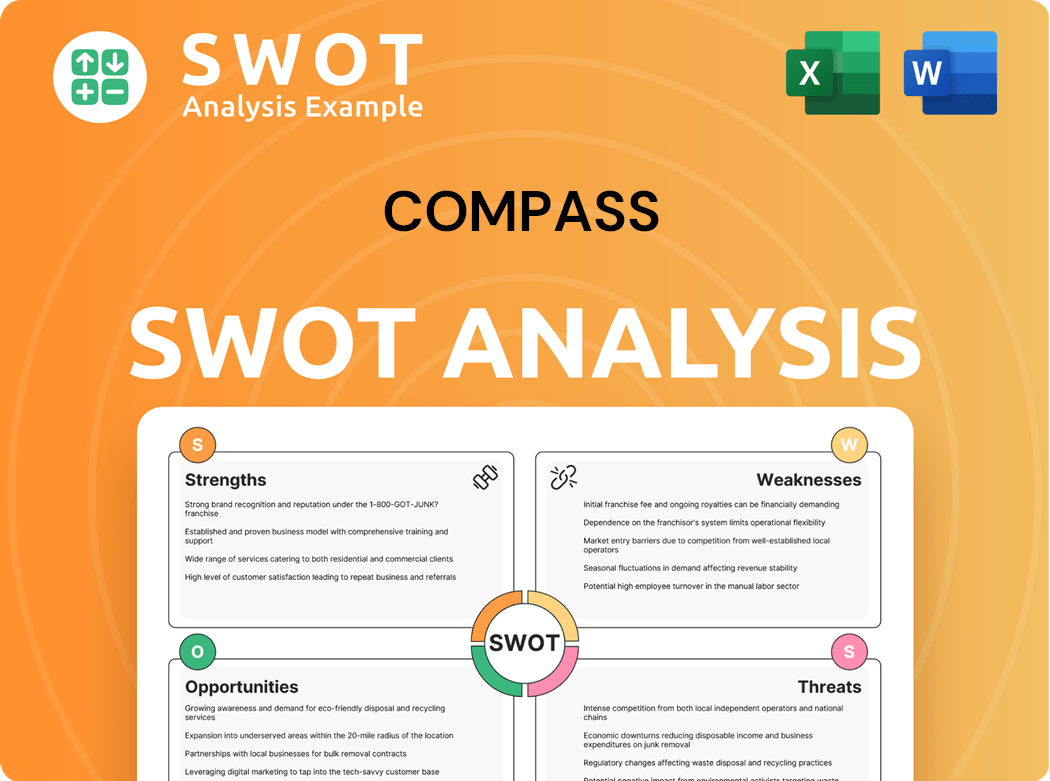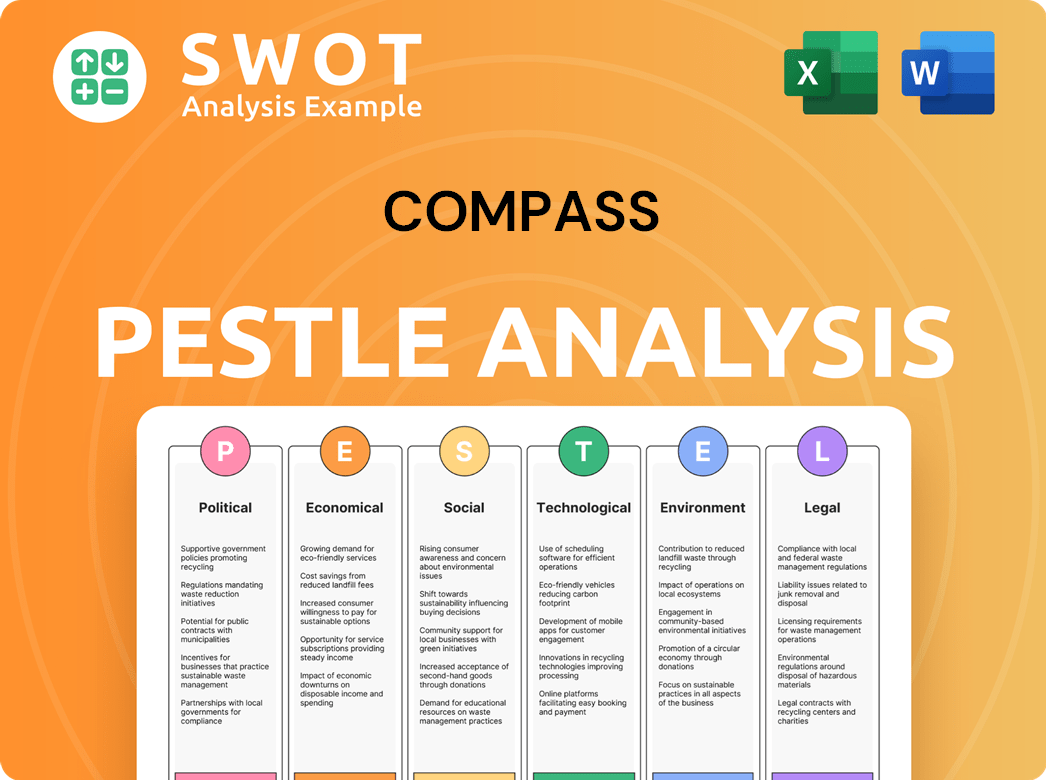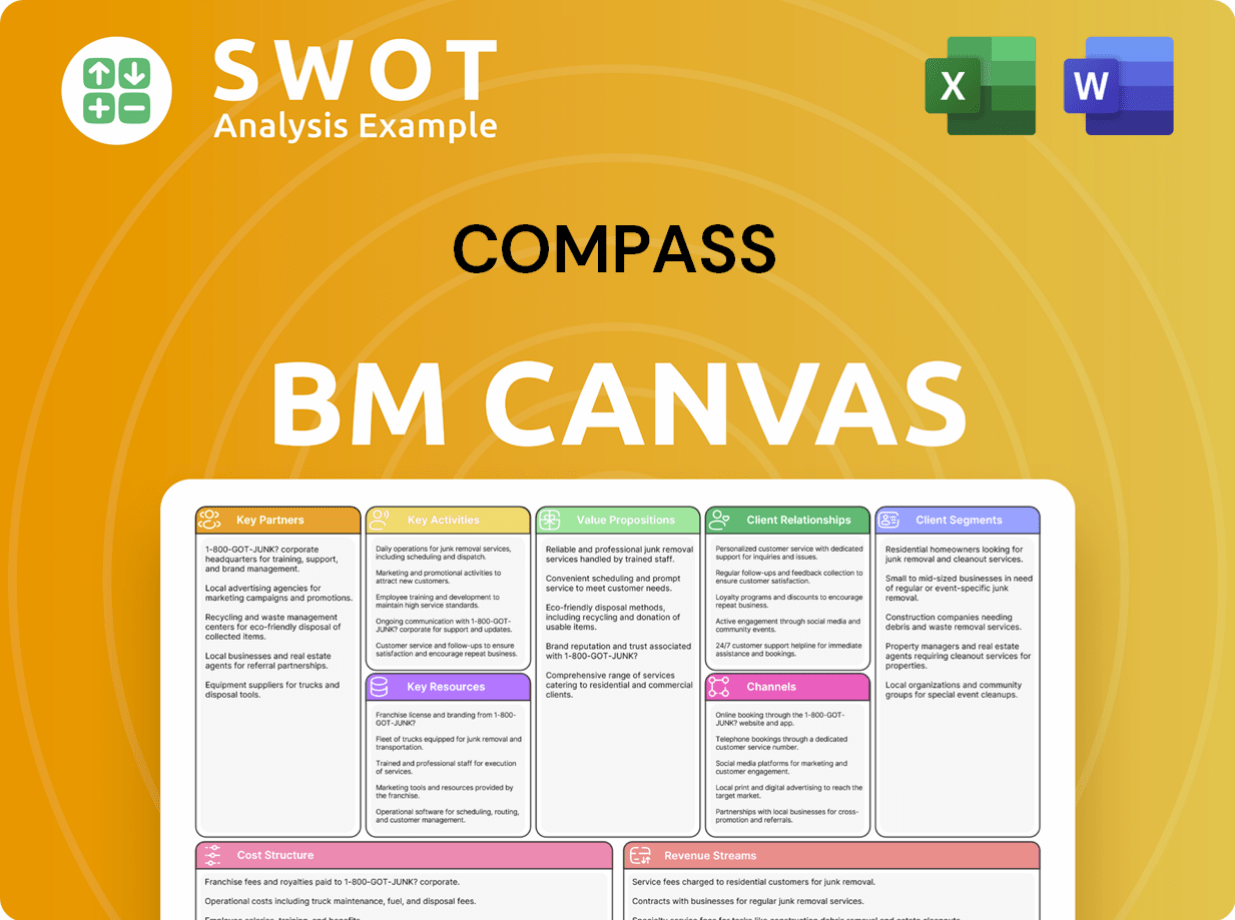Compass Bundle
Who Really Controls Compass Company?
Unraveling the ownership structure of Compass, a leading force in Compass SWOT Analysis, is key to grasping its future. Understanding who owns Compass real estate unveils the strategic drivers and potential shifts within this tech-forward real estate platform. From its inception to its current market position, the ownership of Compass company has evolved significantly.

This exploration into Compass ownership will illuminate the interplay between its founders, key investors, and public shareholders. Examining the Compass ownership structure provides critical insights for anyone tracking the company's performance, including its executives, stock, and overall market influence. Knowing who founded Compass real estate and the current leadership team helps to understand the company's trajectory.
Who Founded Compass?
The Compass company, a prominent player in the real estate industry, was co-founded in 2012. The founders, Robert Reffkin and Ori Allon, brought distinct expertise to the venture, setting the stage for its growth. Their combined vision helped attract early investors and shape the company's initial trajectory.
Robert Reffkin, the current CEO of Compass, contributed a background in finance and entrepreneurship. Ori Allon, the Executive Chairman, is a technology entrepreneur with a track record of successful exits. The early ownership structure likely saw the founders holding significant stakes, though the exact initial equity split is not publicly detailed.
The early financial backing of Compass real estate came from a mix of angel investors and venture capital firms. These early investments were crucial in providing the capital needed for Compass to develop its technology, expand its agent network, and establish its market presence.
Robert Reffkin and Ori Allon co-founded the company in 2012. Reffkin is the current CEO, and Allon serves as Executive Chairman. Their combined expertise in finance, technology, and entrepreneurship was key to the company's early strategy.
Early investors included Kenneth Chenault and Marc Benioff. Venture capital firms like SoftBank's Vision Fund, Thrive Capital, and Lightspeed Venture Partners were also significant early backers. These investments were crucial for the company's initial growth.
While the specific initial equity splits are not publicly available, it's common for co-founders to hold substantial stakes. These initial holdings are typically diluted through subsequent funding rounds as the company grows and attracts more investment.
Vesting schedules are standard for founder shares to ensure long-term commitment. The specifics for Compass's founders are not publicly disclosed. These schedules help align the founders' interests with the company's long-term success.
There have been no widely reported major initial ownership disputes or buyouts among the founding team. This stability in the early stages helped maintain focus on the company's growth and strategic goals.
The founding team's vision of a technology-driven real estate platform attracted early investors. This vision shaped the initial distribution of control and helped establish the company's core values and mission.
The early investors played a crucial role in the development of Compass ownership structure. The company's history, including its early funding rounds and the contributions of its founders, is well-documented. For more details on the company's journey, you can read this article about the company. The initial investments provided the necessary capital for technological advancements and market expansion.
The founding team's background in finance and technology was instrumental in attracting early investors and shaping the company's direction. Early investments from prominent figures and venture capital firms provided the necessary capital for growth. The absence of major initial ownership disputes contributed to stability during the early stages.
- Co-founded by Robert Reffkin and Ori Allon in 2012.
- Early investors included Kenneth Chenault, Marc Benioff, and SoftBank's Vision Fund.
- No significant initial ownership disputes or buyouts.
- The vision of a technology-driven real estate platform attracted investors.
Compass SWOT Analysis
- Complete SWOT Breakdown
- Fully Customizable
- Editable in Excel & Word
- Professional Formatting
- Investor-Ready Format

How Has Compass’s Ownership Changed Over Time?
The journey of the Compass company into the public sphere began on April 1, 2021. It started trading on the New York Stock Exchange under the ticker 'COMP'. The initial public offering (IPO) set the share price at $18, which generated about $450 million and valued the company at roughly $7 billion. Since then, the ownership structure has changed. A significant portion of the company is now held by institutional investors and the general public.
As of early 2025, the major players in Compass's ownership include venture capital firms that invested before the IPO, along with institutional investors and the co-founders. SoftBank's Vision Fund, through different entities, continues to be a major shareholder. It was a leading investor in several private funding rounds. Other significant institutional holders include investment management firms such as Vanguard Group, BlackRock Inc., and State Street Corp. These firms usually hold large stakes in public companies through various funds and ETFs. For example, by the end of 2024, institutional ownership of COMP shares was reported to be around 60-70% of the total outstanding shares. Co-founders Robert Reffkin and Ori Allon still hold considerable individual stakes, although their percentages have decreased since the IPO due to subsequent share issuances and sales.
| Event | Date | Impact on Ownership |
|---|---|---|
| Initial Public Offering (IPO) | April 1, 2021 | Transitioned from private to public ownership; raised approximately $450 million. |
| Subsequent Share Issuances | Post-IPO | Diluted the ownership percentages of existing shareholders, including co-founders. |
| Institutional Investment | Ongoing | Increased the proportion of shares held by institutional investors like Vanguard and BlackRock. |
The shift in ownership has affected the company's strategy. There's a focus on balancing growth with profitability. This has led to increased scrutiny from the public markets regarding financial performance and governance. To understand how the company has approached its marketing, you can read about the Marketing Strategy of Compass.
Compass, a publicly traded company, has seen its ownership evolve since its IPO in 2021. Major stakeholders include institutional investors and the co-founders.
- SoftBank's Vision Fund remains a substantial shareholder.
- Institutional ownership accounts for a significant portion of outstanding shares.
- Co-founders still hold considerable individual stakes.
- Ownership changes influence company strategy and financial performance.
Compass PESTLE Analysis
- Covers All 6 PESTLE Categories
- No Research Needed – Save Hours of Work
- Built by Experts, Trusted by Consultants
- Instant Download, Ready to Use
- 100% Editable, Fully Customizable

Who Sits on Compass’s Board?
As of early 2025, the Board of Directors of the Compass company is pivotal in its governance, mirroring its ownership structure. The board typically includes executive directors, representatives from major shareholders, and independent directors. Robert Reffkin, serving as Chairman and CEO, represents the executive leadership and a significant founder stake. Ori Allon also holds a board seat, representing his co-founder ownership. Representatives from major investment firms, such as SoftBank Vision Fund, may also be present on the board, reflecting their substantial investment in Compass real estate. Independent directors are also appointed to ensure a balanced perspective and uphold corporate governance standards.
Key board members often include individuals associated with major investment firms that hold substantial equity in Compass. The board's composition is crucial for overseeing the company's strategic direction and ensuring accountability to shareholders. The presence of both executive and independent directors helps to balance the interests of management and the broader investor base. The board's decisions significantly influence the company's performance and its ability to navigate the competitive landscape of the real estate market.
| Board Member | Title | Affiliation |
|---|---|---|
| Robert Reffkin | Chairman and CEO | Compass |
| Ori Allon | Director | Compass Co-founder |
| Representative | Director | SoftBank Vision Fund |
Compass operates primarily under a one-share-one-vote structure for its Class A common stock, which is publicly traded. However, some companies may have dual-class share structures. While publicly available information indicates a standard one-share-one-vote for Class A, the specifics of any founder-held Class B shares and their associated voting rights would be detailed in their SEC filings. These structures, if present, can grant founders or early investors outsized control despite holding a smaller percentage of economic ownership. To understand the Growth Strategy of Compass, it's important to consider how its leadership and ownership structure influence its strategic decisions and market positioning.
The board of directors at Compass, including Robert Reffkin and Ori Allon, plays a key role in the company's governance. The company operates under a one-share-one-vote structure for its publicly traded Class A common stock. Key investors, such as SoftBank Vision Fund, often have representation on the board.
- Robert Reffkin is the Chairman and CEO.
- Ori Allon is a co-founder and board member.
- SoftBank Vision Fund is a major investor.
- Compass's ownership structure is crucial for understanding its strategic direction.
Compass Business Model Canvas
- Complete 9-Block Business Model Canvas
- Effortlessly Communicate Your Business Strategy
- Investor-Ready BMC Format
- 100% Editable and Customizable
- Clear and Structured Layout

What Recent Changes Have Shaped Compass’s Ownership Landscape?
Over the past few years (2022-2025), the ownership structure of the Compass company has seen some shifts. Since its IPO in 2021, the real estate market's challenges have influenced the company's stock performance, affecting the value of shareholders' investments. While there haven't been major share buybacks or secondary offerings to drastically change ownership, routine equity plans for employees and executives have led to minor adjustments.
A key trend affecting Compass ownership, and the real estate technology sector in general, is the increasing focus on profitability. This has led to a stronger emphasis on operational efficiency and cost management. Institutional ownership in publicly traded companies, including Compass, continues to grow as large asset managers allocate capital across various sectors. Founder dilution is a natural progression for growth-stage companies that go public and raise additional capital; Robert Reffkin and Ori Allon remain significant shareholders, though their percentage ownership has decreased over time as more shares are issued.
As of early 2025, there have been no public statements from the company or analysts indicating an immediate plan for privatization or a major restructuring of its public listing. Future ownership changes are likely to be influenced by market performance, strategic partnerships, and potential mergers or acquisitions within the real estate technology sector. These could introduce new strategic investors or alter the distribution of shares among existing holders. The company's focus on profitability and operational efficiency may indirectly influence the ownership composition as investors reassess their positions.
The ownership of Compass is primarily composed of institutional investors, company executives, and founders. These investors allocate capital across various sectors. The ownership structure is subject to change due to market performance and strategic decisions.
Compass's stock performance has been influenced by the real estate market's challenges since its IPO. The company is focusing on operational efficiency and cost management. These factors impact investor sentiment and, indirectly, ownership composition.
There have been no significant large-scale share buybacks or secondary offerings reported. Routine equity compensation plans for employees and executives have led to minor shifts. Market performance, strategic partnerships, and potential mergers or acquisitions may drive future ownership changes.
The company's focus on profitability and operational efficiency may indirectly influence the ownership composition. Future ownership changes are likely to be driven by market performance, strategic partnerships, and potential mergers or acquisitions. These factors may introduce new strategic investors or alter the distribution of shares.
Compass Porter's Five Forces Analysis
- Covers All 5 Competitive Forces in Detail
- Structured for Consultants, Students, and Founders
- 100% Editable in Microsoft Word & Excel
- Instant Digital Download – Use Immediately
- Compatible with Mac & PC – Fully Unlocked

Related Blogs
- What are Mission Vision & Core Values of Compass Company?
- What is Competitive Landscape of Compass Company?
- What is Growth Strategy and Future Prospects of Compass Company?
- How Does Compass Company Work?
- What is Sales and Marketing Strategy of Compass Company?
- What is Brief History of Compass Company?
- What is Customer Demographics and Target Market of Compass Company?
Disclaimer
All information, articles, and product details provided on this website are for general informational and educational purposes only. We do not claim any ownership over, nor do we intend to infringe upon, any trademarks, copyrights, logos, brand names, or other intellectual property mentioned or depicted on this site. Such intellectual property remains the property of its respective owners, and any references here are made solely for identification or informational purposes, without implying any affiliation, endorsement, or partnership.
We make no representations or warranties, express or implied, regarding the accuracy, completeness, or suitability of any content or products presented. Nothing on this website should be construed as legal, tax, investment, financial, medical, or other professional advice. In addition, no part of this site—including articles or product references—constitutes a solicitation, recommendation, endorsement, advertisement, or offer to buy or sell any securities, franchises, or other financial instruments, particularly in jurisdictions where such activity would be unlawful.
All content is of a general nature and may not address the specific circumstances of any individual or entity. It is not a substitute for professional advice or services. Any actions you take based on the information provided here are strictly at your own risk. You accept full responsibility for any decisions or outcomes arising from your use of this website and agree to release us from any liability in connection with your use of, or reliance upon, the content or products found herein.